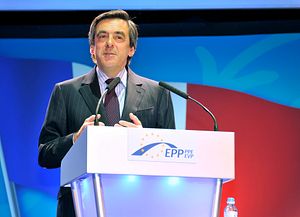After Brexit and Donald Trump’s success in the American elections in 2016, several elections will be held in 2017 in two major European countries: Germany and France.
China will be carefully scrutinizing these elections. Because of Brexit, Beijing needs to define new partnerships with Continental Europe. In Germany, although her immigration policy has been under criticism, Angela Merkel still has some chance of being elected for a fourth term. In France, the game is not yet over. According to the latest polls, current President François Hollande is very unlikely to be re-elected due to the sluggish economy. Marine Le Pen, leader of the far right movement “Front National” (National Front) has seen her popularity increase since the last regional elections in 2015, but she still faces a glass ceiling that may prevent her from being the next French president. François Fillon, who was chosen through the primary elections of the main right-wing party “les Républicains” (the Republicans) in late November 2016, has the most chance of being elected president in May 2017.
Foreign affairs is not traditionally a determining factor in French presidential elections. In their initial programs and declarations, candidates have timidly unveiled their positions on the diplomatic policies that France should adopt, focusing exclusively on Syria and relations with Russia. Fillon in particular has been defending a new partnership with Russia. Although Moscow is a key player in the resolution of the Syrian crisis and the European Neighborhood Policy, relations between France and Russia are weak in contrast with other major powers such as China. China is France’s fifth largest trading partner after Germany, Italy, the United States and Belgium; investments from China have largely increased in France in the last couple of years.
Having said this, France’s policy toward China is still not a priority for presidential candidates. In Fillon’s program, China is mostly depicted as a threat. Fillon, like most French politicians, is opposed to China being granted the status of a market economy. Although he is regarded as a supporter of economic liberalism, Fillon wants Europe to pursue anti-dumping policies toward China. Furthermore, in his program, he fails to see China’s investments in the innovation sector as an opportunity for France and Europe.
In the past, when Fillon was prime minister (2007-2012), Sino-French relations were relatively cold due to President Nicolas Sarkozy’s meeting with the Dalai Lama and Fillon’s declaration that China was not a democracy in 2008. During his state visit to Beijing in December 2009, Fillon did not attempt to develop a strong long term partnership with China, but only promoted French companies.
However, France’s next president will need to develop consistent relations with Beijing. For its part, Xi Jinping’s administration will have to pay serious attention to France’s policies, because both countries share common interests on several issues.
In Europe, both France and China will have to protect their interests in the Brexit crisis. France’s majority government-owned company EDF and the Chinese state company China General Nuclear (CGN) are stakeholders in the EPR nuclear reactor project in the U.K.’s Hinkley Point and have plans to construct further reactors in the United Kingdom. It is still unclear if Brexit will put an end to the Sino-British “golden age,” but Beijing will undoubtedly seek to develop stronger relations with EU member states. Furthermore, for China, it will be important to support all initiatives backed by major European partners, including France, to fight against rising populist protectionism in Europe.
Regarding the South China Sea disputes, France’s new president will have to decide whether or not the French navy will continue to patrol the disputed areas in order to enforce freedom of navigation, as has been decided by the current defense minister, Jean-Yves Le Drian.
In the Pacific, France’s next leader will need to examine the evolution of New Caledonia. In 2018, a self-determination referendum will be held in the French territory of New Caledonia. Fillon has already declared himself to be in favor of the island remaining a part of the French Republic. New Caledonia’s economy is largely dependent on nickel mining, and is progressively shifting from the Australian to the Chinese market. Nickel ore exports to China have only been allowed since April 2016.
Another point to be examined will be the large intercontinental projects launched by China, especially the “One Belt, One Road” initiative (OBOR). This program aims to reactivate the historic Silk Road(s) between China and Europe through the improvement of transportation and energy infrastructure and by easing trade between the two regions. Although it is primarily designed for the benefit of Chinese companies, France’s next president should at least develop his/her own strategy to take advantage of this program, putting pressure on EU members to adopt a common position toward OBOR.
France still remains a major EU power — all the more so since Brexit — and in consequence the next presidential election needs to be examined attentively by China. Until now, candidates for this election have overlooked the importance of Sino-French relations with regard to the domestic economy; François Fillon, the current front runner, will urgently need to develop a position on Beijing in order to improve relations between the countries if he is elected.
Dr Sebastien Goulard works at Cooperans, a public affairs consultancy specialised in governance and Sino-European relations. Goulard completed a Ph.D. in economic and social development studies from EHESS (Ecole des Hautes Etudes en Sciences Sociales, ‘School for Advanced Studies in the Social Sciences’), Paris.
































